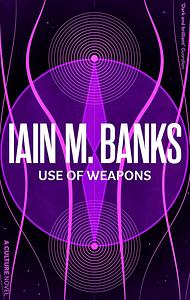Take a photo of a barcode or cover
Cheradenine Zakalwe was born outside the Culture's sphere of influence, but who was later hired as an agent in its Special Circumstances department whose function it is to secretly intervene in less advanced civilization and provide guidance without them knowing that they had been manipulated in this way. He had successfully completed a number of difficult jobs and his military effectiveness is beyond a doubt, but his latest mission has been a complete failure.
Still, they need him again. War is imminent in the Voerenhutz cluster. Its peace-preserving and beloved president, Tsoldrin Beychae, abdicated some years ago and ongoing disputes are becoming increasingly more heated. There are the so-called Humanists who fiercely oppose the introduction of artificial intelligence in their society. To them only human (or at least biological) experience has intrinsic value. They want to rely on terraforming to further their course. Since the Culture is controlled by (artificial) Minds, it's easy to see why they take offense at these developments. They need Zakalawe because of his special connection to the ex-president.
Use of Weapons, the third novel in the Culture series, is very episodic in nature. It has a main line of action told continuously over chapters counting forward, yet there are also chapters that progress back in time and that provide more and more detail to our anti-hero protagonist's troubled past. There is no straight-forward narrative to the more character-oriented sections, but I highly enjoyed the sense of mystery gradually resolved by the slowly emerging wider picture.
Zakalawe desperately wants to see his sister Livueta again – in fact, this is what the Culture offers him as payment – but we soon learn that they had a severe falling out, though it remains unclear what happened. There is the puzzling obsession with chairs and casual remarks about some Chairmaker that don't seem to make much sense (what importance could a chair have?). There is the usual lost love, and there is the question of the purpose to his later life's ventures. In the present there is even the question of where he is and how he could escape.
Iain M. Banks's vivid writing does a great job to make you excited for his little projects that have no clear connection to Zakalawe's overall arc. There is the great moment of retribution at the first (or last) assignment, the narrative told from the arrogant aristocrat's viewpoint at the second (to last), the nighmarish state of consciousness where he tries to deceiver the meaning of metaphors. There is chapter told in the haze of a drug-induced ritual. Later Zakalawe suddenly even finds himself the religious leader in an escalating war.
Of course Zakalawe is by far the most completed character, but there are many highly enjoyable personalities in the wider cast. The most important for the overall plot is Diziet Sma who is of interest mainly because of her more personal relationship to our otherwise rather distant protagonist. I loved the humorous dynamics with her drone, Skaffen-Amtiskaw, who don't always see eye to eye and that give us a sense that the Culture might not be as disinterested and objective as it claims or even thinks it is.
In one of the later chapters, a minor character expresses a truism that well renders the state of affairs with novels of a less conventional plot structure: "What one person may call a proper story may not please somebody else." I thought that the book itself was a great example. For me personally it was a bit too fragmented for my liking, though I cannot but praise the exciting and repeatedly surprising ride. This is especially true for the big plot twist at the very end that throws a completely different light and on the character we thought we had learned to understand.
Though genuinely funny at times, there is the underlying sense of tragedy throughout the tale of Zakalawe's life. Maybe it's too much to say that I enjoyed the melancholy, but it was still highly satisfying when in the end you understand where it was coming from.
Rating: 3.5/5
Still, they need him again. War is imminent in the Voerenhutz cluster. Its peace-preserving and beloved president, Tsoldrin Beychae, abdicated some years ago and ongoing disputes are becoming increasingly more heated. There are the so-called Humanists who fiercely oppose the introduction of artificial intelligence in their society. To them only human (or at least biological) experience has intrinsic value. They want to rely on terraforming to further their course. Since the Culture is controlled by (artificial) Minds, it's easy to see why they take offense at these developments. They need Zakalawe because of his special connection to the ex-president.
Use of Weapons, the third novel in the Culture series, is very episodic in nature. It has a main line of action told continuously over chapters counting forward, yet there are also chapters that progress back in time and that provide more and more detail to our anti-hero protagonist's troubled past. There is no straight-forward narrative to the more character-oriented sections, but I highly enjoyed the sense of mystery gradually resolved by the slowly emerging wider picture.
Zakalawe desperately wants to see his sister Livueta again – in fact, this is what the Culture offers him as payment – but we soon learn that they had a severe falling out, though it remains unclear what happened. There is the puzzling obsession with chairs and casual remarks about some Chairmaker that don't seem to make much sense (what importance could a chair have?). There is the usual lost love, and there is the question of the purpose to his later life's ventures. In the present there is even the question of where he is and how he could escape.
Iain M. Banks's vivid writing does a great job to make you excited for his little projects that have no clear connection to Zakalawe's overall arc. There is the great moment of retribution at the first (or last) assignment, the narrative told from the arrogant aristocrat's viewpoint at the second (to last), the nighmarish state of consciousness where he tries to deceiver the meaning of metaphors. There is chapter told in the haze of a drug-induced ritual. Later Zakalawe suddenly even finds himself the religious leader in an escalating war.
Of course Zakalawe is by far the most completed character, but there are many highly enjoyable personalities in the wider cast. The most important for the overall plot is Diziet Sma who is of interest mainly because of her more personal relationship to our otherwise rather distant protagonist. I loved the humorous dynamics with her drone, Skaffen-Amtiskaw, who don't always see eye to eye and that give us a sense that the Culture might not be as disinterested and objective as it claims or even thinks it is.
In one of the later chapters, a minor character expresses a truism that well renders the state of affairs with novels of a less conventional plot structure: "What one person may call a proper story may not please somebody else." I thought that the book itself was a great example. For me personally it was a bit too fragmented for my liking, though I cannot but praise the exciting and repeatedly surprising ride. This is especially true for the big plot twist at the very end that throws a completely different light and on the character we thought we had learned to understand.
Though genuinely funny at times, there is the underlying sense of tragedy throughout the tale of Zakalawe's life. Maybe it's too much to say that I enjoyed the melancholy, but it was still highly satisfying when in the end you understand where it was coming from.
Rating: 3.5/5
Lost interest. No connection to previous novels.
I have never experienced before the feeling, halfway through a book, that, providing it didn't throw it all away, it was going to become one of my favourites. Use of Weapons has become a favourite. I want to read it again. I knew there was a twist; I guessed what the twist was, at least the bare bones of it, quite early on; it was still shocking. But the twist is not the book. The characters, Zakalwe, Sma, the Culture itself, are complicated and flawed, make you question their motives and, even if you don't get the answers you expect, or any at all, you want to delve deeper and question all the more. Loved it.
"You have the power, Tsoldrin, whether you like it or not; just doing nothing is a statement, don't you understand that? What is all your studying worth, all your learning, all your knowledge, if it doesn't lead to wisdom? And what's wisdom but knowing what is right, and with is the right thing to do?"
"The sky was aquamarine, stroked with clouds. She could smell the grass, and taste the scent of small, crushed flowers."
"Most people are not prepared to have their minds changed...And I think they know in their hearts that other people are just the same, and one of the reasons people become angry when they argue is that they realize just that, as they trot out their excuses...I strongly suspect the things people believe in are usually just what they instinctively feel is right; the excuses, the justifications, the things you're supposed to argue about, come later. They're the least important part of the belief. That's why you can destroy them, win an argument, prove the other person wrong, and still they believe what they did in the first place."
"The sky was aquamarine, stroked with clouds. She could smell the grass, and taste the scent of small, crushed flowers."
"Most people are not prepared to have their minds changed...And I think they know in their hearts that other people are just the same, and one of the reasons people become angry when they argue is that they realize just that, as they trot out their excuses...I strongly suspect the things people believe in are usually just what they instinctively feel is right; the excuses, the justifications, the things you're supposed to argue about, come later. They're the least important part of the belief. That's why you can destroy them, win an argument, prove the other person wrong, and still they believe what they did in the first place."
adventurous
dark
sad
medium-paced
adventurous
dark
medium-paced
Plot or Character Driven:
Plot
Strong character development:
No
Loveable characters:
No
Diverse cast of characters:
Complicated
Flaws of characters a main focus:
Yes
Culture books are like soft porn for liberals. In the future, objective artificial superintelligences make all decisions, technology has eliminated scarcity, and the ability to construct enormous space habitats has effectively created a universe where everybody can pretty much live whatever kind of life they want without prejudice. And of course, all that super advanced technology means that whenever some less-enlightened society get out of line, the good guys are able to spank them pretty thoroughly without breaking a sweat. It's fun, but it makes it hard to generate any kind of narrative tension.
challenging
dark
tense
medium-paced
Plot or Character Driven:
A mix
Strong character development:
Complicated
Loveable characters:
Complicated
Diverse cast of characters:
Complicated
Flaws of characters a main focus:
Complicated
Another very enjoyable book. Someday, I will try to find more of the Culture novels.




